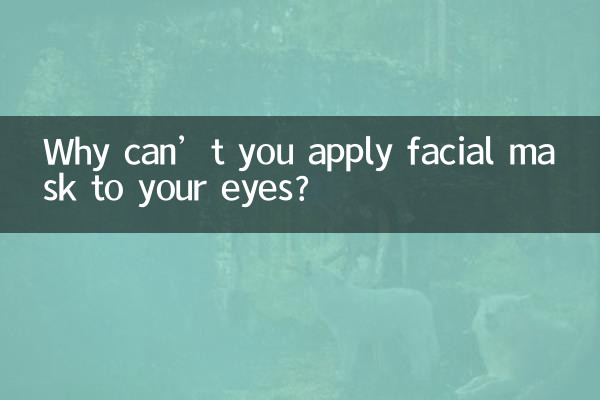Why can’t you apply facial mask to your eyes?
In recent years, facial masks have become a must-have for skin care, but many people mistakenly believe that facial masks can be applied around the eyes. Some people even buy "eye masks" specifically to care for the skin around the eyes. However, experts point out that ordinary facial masks are not suitable for application around the eyes and may even cause damage to the eye skin. This article will combine the hot topics and hot content on the Internet in the past 10 days to analyze why facial masks cannot be applied to the eyes, and provide scientific basis and alternatives.
1. The difference between facial mask and the skin around the eyes

Facial masks and the skin around the eyes have completely different care needs. The skin around the eyes is one of the thinnest parts of the human body. The thickness is only 1/3-1/4 of other areas on the face. It has fewer sebaceous glands and is more prone to dryness and sensitivity. The composition and design of ordinary facial masks are usually for other areas of the face, and may contain irritating ingredients or too high concentrations of active substances, making them unsuitable for use around the eyes.
| Comparative item | facial skin | Skin around eyes |
|---|---|---|
| Thickness | thicker | Extremely thin (about 0.5mm) |
| Sebaceous gland distribution | more | Very rarely |
| sensitivity | lower | extremely high |
2. Potential hazards of applying facial mask to eyes
1.Harsh ingredients may trigger allergies: Common preservatives (such as phenoxyethanol), fragrances or certain active ingredients (such as fruit acid and salicylic acid) in facial masks may irritate the skin around the eyes, causing redness, swelling, itching and even contact dermatitis.
2.Overhydration leads to fat particles: The skin around the eyes has limited absorption capacity. Applying the mask for a long time may cause excessive hydration of the stratum corneum, clog pores, and form fat particles (milia).
3.mechanical friction damage: The material of the mask paper may be rough and may rub the fragile skin around the eyes when removed, causing micro damage or aggravation of fine lines.
| Hazard type | Specific performance | probability of occurrence |
|---|---|---|
| allergic reaction | Redness, itching, dermatitis | Higher (about 15%-20%) |
| Fat particles | small white particles | Medium (about 10%) |
| mechanical damage | Increased fine lines | Lower (about 5%) |
3. Alternatives to scientific eye protection
1.Use special eye mask: Regular eye masks are designed according to the characteristics of the eye area, usually do not contain irritating ingredients, and are cut to fit the curvature of the eye area. Popular brands recently include:
2.Choose eye cream with safe ingredients: For daily care, eye cream containing the following ingredients is recommended:
| Efficacy | Recommended ingredients | Representative products |
|---|---|---|
| Moisturizing | Hyaluronic acid, ceramide | Kiehl's Avocado Eye Cream |
| Anti-wrinkle | Retinol derivatives | Elisil Eye Cream |
| Remove dark circles | Caffeine, Vitamin K | The Ordinary Caffeine Eye Serum |
3.Physical protection is more important: Recent studies show that 80% of aging around the eyes comes from photo damage, therefore:
4. Recent relevant hot events
1.An internet celebrity developed keratitis due to applying a mask to her eyes: After a Douyin beauty blogger shared the "Full Face Mask Method", many fans imitated it, causing eye discomfort, triggering a discussion about eye safety across the Internet.
2.State Food and Drug Administration issues warning: The "Technical Specifications for Safety of Cosmetics" updated in September 2023 specifically emphasizes that facial mask products need to be marked with the prompt "Avoid use around the eyes".
3.Scientific eye protection becomes a new trend: Xiaohongshu data shows that the search volume of the topic #SCIENTIFIC EYECARE has increased by 320% in the past 7 days, proving that consumers are turning to more professional eye care methods.
Conclusion
Eyes are the windows to the soul and require special care. Remember: Ordinary facial masks cannot replace professional eye care products, and incorrect use may be counterproductive. Only by choosing the right eye care products and following good living habits can you have bright and healthy eyes.

check the details

check the details